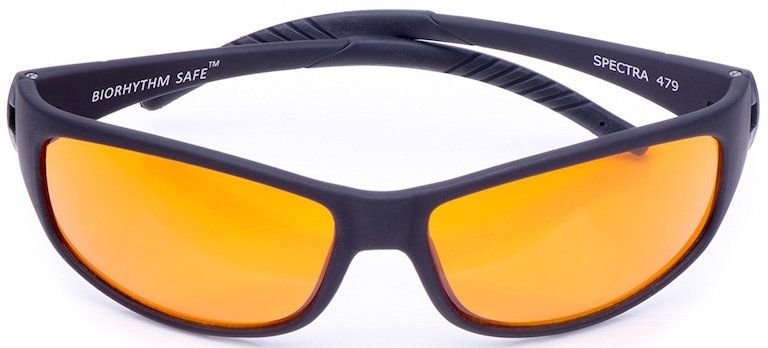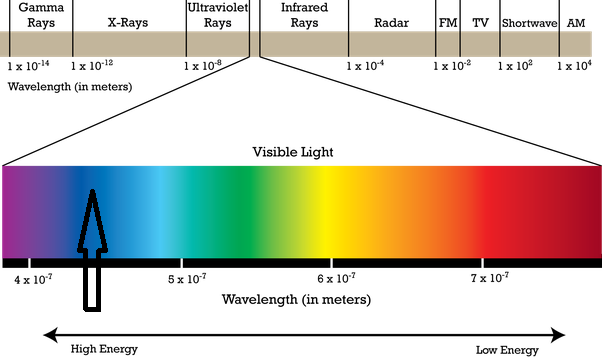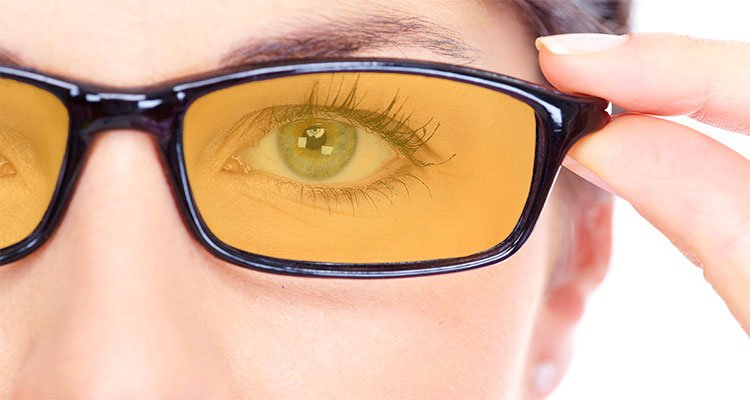They may look like weird orange safety glasses but actually, they are.
 [1]
[1]They're also known as blue blocker glasses and the idea is that wearing these at night can improve your sleep. How true is that?
Blue light blocking glasses are nothing new, you may have seen different brands like Gunnar Optiks and the concept is the same, no matter what type you get. They basically block varying amounts of light in the blue wavelength range of the light spectrum.

[electromagnetic light wave spectrum]
Companies make all sorts of claims for the benefits from these glasses, anything from reducing eye strain to improving sleep and even improving video game performance.
What's really going on with these glasses?
The truth is that blue light does have a significant effect on the brain and we've known this for a while. The higher the energy of light waves, the shorter they are, so the closer they are to the blue and ultraviolet side of the spectrum.

The lower energy on the other hand, the closer to the red and infrared side.
If you consider sunlight, that is pretty high energy, so it has lots of blue light in it and if you want to get technical, the average color temperature of sunlight is 6500K and you may have seen this number system on lightbulb labels or something like that but that's not the point.
This is all important because when the brain sees high-energy blue light, it doesn't know that it's a computer screen or a modern light bulb, it thinks it's sunlight and therefore thinks it must be daytime. Put simply, computer screens or any other type of light bulbs that produce a lot of blue light keep you awake much longer which can obviously cause problems.
Blue light is also thought to cause more eye strain because being shorter wavelength, its apparently more difficult for the eye to focus. You combine that with the fact that computer monitor typically flicker at 60 Hertz to produce an image which can also cause eye strain. It's no surprise that digital screens in general can be problematic at times for our eyes and our brain.
Where do these glasses come in?
Well, it should be extremely obvious from the name alone that blue light blocking glasses block blue light and they aren't really anything special. They’re basically just an orange piece of plastic though there's probably a bit more to that, that goes into the manufacturing process.
What does the world look like without blue light?
Actually, not too different, just a bit more orange as you can imagine and after a few moments of wearing these glasses, your brain actually will adjust so you won't notice it as much as you'd think.

If you've ever used the program “Flux” on your computer which I highly recommend, these glasses are lot like that but it’s all over the place, not just your computer screen. It's funny because if you look at a light source that is blue, like a status light on some device, it will look like that light is off, you can't even see it or if you try to put an image of a blue box on your phone screen and look at it, it just looks like a black box. It's pretty crazy but it proves that these glasses actually work.
The brain is pretty good at adjusting to different lighting conditions and will auto white balance just like a camera might. When you go from wearing these glasses for a while and then take them off, everywhere will look really bright and almost have a bluish hue for a moment because it had adjusted towards the orange side. Some yellow incandescent lights might look blue for a second, it's kind of crazy.
Incandescent lights do have some blue light though not much. Our brains basically have no blue light at all because it's a much lower color temperature, so it should make sense why these types of glasses would help in a lot of ways even for light sources that you wouldn't think have an effect. Fluorescent and LED lights that are designed to look like incandescent do produce blue light too and usually even more with spikes in the blue spectrum.
Do you use blue light blocking glasses? You can let me know you think in the comments. I hope this all was really helpful to you guys and if you liked the article, don’t forget to hit that upvote button down below.
Have a great week ahead.
References: 1 - 2 - 3 - 4
Image sources: 1 - 2 - 3 - 4


GIF made by @foundation
Thanks to @camzy for this amazing toon.


The glasses are cool buh why would I want one when I can use softwares to make my screen OK for night use. It would cost me money to purchase the glasses,there would be discomfort from wearing the glasses for a long time and it might take a while to readjust to normal lighting when am done with my screens. @ememovic would you really want one? No lie
Y not
Tech boss
Keep it pushing
I never knew
Thanks
Woah need them asap will be easier to play dota all night.
That would be great.
Wow I need a pair!
These are great
I’m resteeming this
Everyone needs a pair!
Thank you
Are they available in Nigeria
You can order it from amazon, ebay or aliexpress.
I really need this, am on my pc 24/7
Yea, you do.
Helpful and informative post - I had no idea about this. Thank you very much, for sharing!
You'e welcome.
Thanks for this helpful article and yes this is amazing for people who work on their computer for there job and youse there computer for most of the day and it helps you sleep better thx fab
I'm glad you found it helpful. Thanks for dropping by.